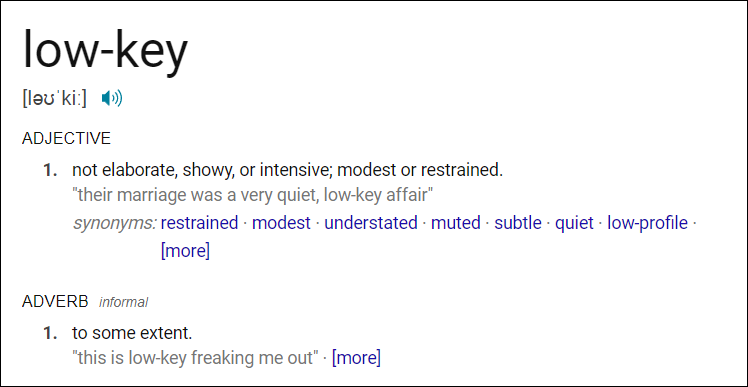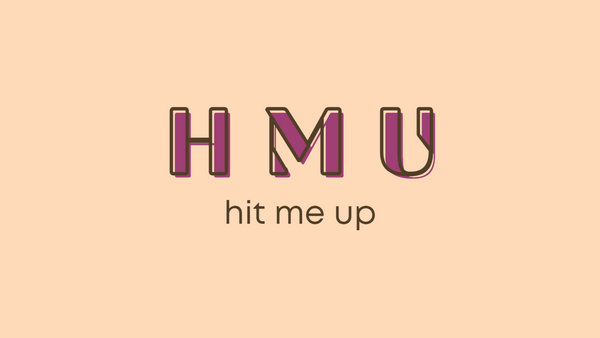Keep it low-key, okay? Geez, he’s low-key cute. I low-key like that kind of music. I like low-key personalities. Loki is low-key the most gorgeous MCU character. Terrible puns, but they work.
Low-key began its journey as slang towards the end of the 2000s. It is speculated to have begun its journey as a trendy colloquial term through rap lyrics of the time. ‘Low-key’ soon joined popular culture and made its way into our informal dialect. However, the term didn’t always mean all that it does today, as slang.
A few decades ago, low-key was denoted as tone of speech, and before that, a low musical note. Today, low-key’s mainstream definition deviates from all that it did before. It has a whole new makeover, but with the same basics of ‘keeping it low’.
So, when did the revised version get famous, what does it mean and how can you correctly use it so the people of the present generation don’t misunderstand you?
The Story of Low-Key

‘Low-key’ has always been part of our dialect — only, in every sphere of communication we’ve incorporated it, the term has picked up new meaning and inferences. Nevertheless, each definition has a significant if not exact reference to its basic meaning.
After being a soft, low key in the musical sphere, the term traveled to the part where it began meaning what it does today. During the 1800s, low-key was given the denotation of softness, mellowness, subtlety, and a state of being restrained or having restraint.
Eventually, low-key grew with this literal meaning and gelled with the social media angle of looking at and using the term in reference to modesty and ease. The term also picked the connotation of measurement — defining slight, small amounts.
The colloquial usage of the term began during the late 2000s and was used in both verbal and digital conversations alike. Low-key officially became the latest social media slang on Twitter in 2015. Though the slang had its peaking moment(s) and has stayed in the vernacular, ‘Low-key’ has had a fluctuating usage over time. It has its highs and lows.
What Does Low-Key Mean on Social Media?
Every word or acronym that becomes slang always evolves in meaning. The same applies to low-key as well. Alongside being the slang definition of keeping a low profile, low-key also means subtlety, to a small degree, having/keeping a slow pace, and a state of being relaxed, carefree, and unnoticeable.
The term has a list of meanings on social media, each of them equally relevant to the current online connotation of low-key. Every slang is contextual on social media. Low-key, too, depends on its context to convey the correct meaning. But there’s another parameter while understanding and using low-key — the placement of the term.
This famous English criterion coming to life for slang
Word placement is usually not a criterion for digital slang. However, for ‘Low-key’, both the premise of the conversation as well as the location of the term in a sentence is necessary to help get rid of ambiguity while articulating and understanding the term. So, to properly say what you mean with ‘low-key’ and ensure it is read in the same way, be mindful of the context, but pay more attention to where you’re placing the word.
Here’s an example elaborating on what ‘word placement’ means while using low-key — while bearing in mind all that the term means, online.
- Yeah, she told she low-key has a crush on her.
- Yeah, she told she has a low-key crush on her.
In this example, there are two different sides to the same story that can blend into each other at times. She has a crush on her. But, the intensity and visibility of that crush vary. In the first example, the placement of ‘low-key’ signifies she discreetly has a crush on someone. Here, the crush is a secret – one that’s possibly spoken in confidence.
The second example suggests she has a small, subtle, or slight crush on the person. Here, the crush is measured due to the placement of the term. Here’s another variation of the same sentence, but with a different placement of ‘low-key’:
- Yeah, she low-key told she has a crush on her.
Now, this example branches from the first. The matter of having a crush on someone was confided and the conversation was possibly meant to stay low-profile as well. It was spoken in discretion, with trust, and maybe in a soft tone too.
The placement may seem confusing at first, but it helps precise communication without unnecessary misunderstanding while using the slang.
Why Does Low-Key Have Such a Confusing Use-Case?
This section is to strictly explain the section above. The reason why ‘low-key’ may be confusing to use and moreover in understanding a context’s intention is that it doesn’t work uni-dimensionally like most internet slang.
Low-key is an adjective and an adverb – it better describes a noun and a verb. This is how it can be used as a unit and description of the same measurement and intensity – slight/slightly, subtle/subtly, little, less, small, etc.
Apart from sizing something and describing its intensity, ‘low-ley’ also works as an adjective and adverb while depicting the nature of someone or something — modest/modestly, simple/simply, conventional/conventionally, ordinary/ordinarily, etc.
Additionally, low-key is an alternative to the adjectives and adverbs of discretion, secrecy, confidentiality, etc. It echoes the concept of keeping a low profile, being the opposite of all synonyms of loud, and possibly even being pleasant and nice. All in all, ‘low-key’ is a compounding slang because it works as an adjective and as an adverb.
Again, the dissection of the word here may seem complex, but it is pretty easy to understand and use online and offline – once you get a low-key hang of it.
How to Use Low-Key in the Contemporary Style?
The way Faye lowkey had a great plan to pin everything on Laurie. Would’ve solved half of everyone’s problems 😭— Ashley K. (@AshleyKSmalls) February 28, 2022
Embedded JavaScript
Considering there are three to four different use-cases of low-key in the internet world that are effortlessly merging into our spoken communication, we’ll list out all the popular use-cases of low-key and add any other possible ways of applying the slang online. These use-cases are relevant even in personal (in person) conversations. However, it is informal slang and must never be used formally unless the person(s) is okay with it.
While expressing an estimate
‘Low-key’ is a casual way of measuring something or indicating an intensity. Evidently, that ‘something’ is very slight, subtle, and in less amount. So, if you’re implying minimal quantity, quality, or intensity you can use ‘low-key’. For example, ‘They were low-key close to storming out of the meeting’, ‘It low-key tasted good despite being stale. I feel horrible’, or ‘He was low-key irritated when you said that. Surprised you didn’t see it’.
To convey the nature of something or someone
A simple, laid-back, humble, non-showy and down-to-earth persona fits ‘low-key’ as a character sketch. If you’re referring to something or someone who is like this, you could use ‘low-key’ to describe them.
Here, the slang is a bracket of qualities that are more often than not positive and heart-warming. Like, ‘I seriously admire people who are famous and rich but still live a low-key life’ or ‘Oh, her family’s low-key, man. Mine’s the one that’s loud and obnoxious. SMH’.
Advisory against hype
We know people who blow things (good and bad) out of proportion. Sometimes, we are that person. Low-key is the antonym to such a spectacle. When you suggest being low-key, you’re referring to maintaining a low profile. Now, this can be for many reasons, including attempts to retain confidentiality, avoid recognition, avoid attention, etc.
For instance, ‘Hey, man. Let’s stay low-key on the plan, okay? Nothing’s official yet’, ‘If you don’t want to get caught, stay low-key. DON’T show you’re drunk, or ‘I always prefer being low-key on all my achievements. Not sure if that’s a good thing’.
While keeping a secret
A current alternative to secrecy is ‘low-key’. The term, in itself hints at lingering under the radar. No hype, no attention, no noise. Low-key is the essence of what a secret is. Keep it to yourself. Keep it low-key. If you’re referring to a secret, someone who’s secretive, and ‘secrecy’ in any shape or form, you can use low-key.
Some examples are – ‘Dude. It’s impossible to ever know more about her. She’s always low-key’, ‘Now that I’ve told you, better keep it low-key at all times’, ‘I’m okay with the low-key lifestyle, man. But not with your own family! That’s betrayal!’, or ‘Sorry man. I’ve promised to keep it low-key’.
Conclusion
‘Low-key’ is a single word/term/phrase that wears multiple hats of meaning in the present colloquial scenario. Regardless of the number of possible connotations, the core message of ‘low-key’ in any context heads back to basics – being minimal, rustic, restricted, and classified; directly or indirectly.
Low-key works as an adjective and an adverb. It embellishes a noun just as it does, a verb. So, you can use low-key to paint a low-profile, subtle, or discreet picture of anything on both online and offline platforms! Provided the other person(s) knows what it means.










Member discussion